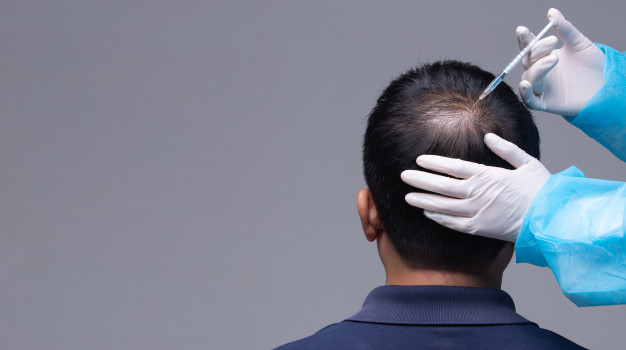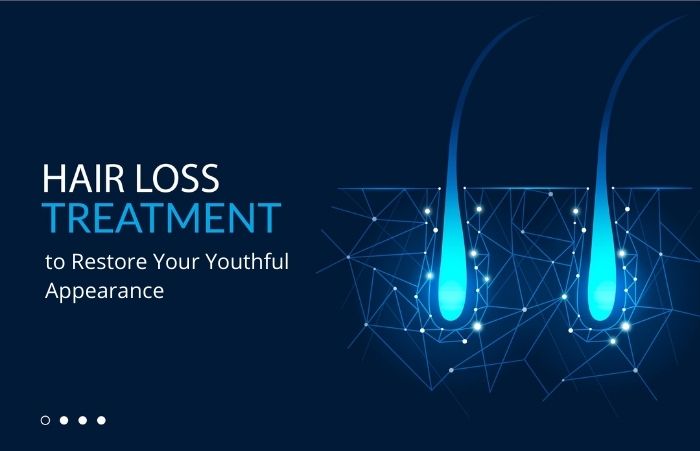What Causes Hair Loss
Does hair loss have you feeling frustrated and self-conscious? You’re not alone! Hair loss is a widespread condition that affects millions of Americans of many types. It may occur as the result of hormonal fluctuations, heredity, or simple aging. Hair loss can affect anyone, but it’s more prevalent in adult men.
This condition, also known medically as Alopecia, tends to affect the scalp, but can also cause hair loss over the whole body. Other terms for this same condition include:
- Male-pattern baldness
- Female-pattern baldness
- Androgenetic Alopecia
Many individuals choose to embrace their newfound baldness while others seek solutions in the form of hair treatments, hairstyles, wigs, hairpieces, or hats. However, there is no wrong approach to solving the issue of hair loss. Before seeking treatment, you will want to consult with your doctor to pick the solution that’s right for you.
Symptoms and Signs of Hair Loss
Hair loss can manifest in many ways and, in some cases, may affect your entire body. This condition may occur quickly or could be a gradual process that takes years to form. Some signs and symptoms of this condition include:
• Gradual Thinning of the Hair on Top of the Head
One of the most common forms of hair loss, an individual’s hair begins to gradually thin and recede from the hairline along the forehead. This can occur in women, yet patterns show more in the center of the scalp than along the hairline.
• Circular or Patchy Spots
Some individuals are prone to losing hair in circular shaped patterns on the scalp, eyebrows, or beard. This condition may be marked by pain or itching in the area prior to hair loss.
• Loosening of Hair
Sometimes a physical or emotional event may trigger hair follicles to loosen. When this happens, hair may fall out in large clumps during combing. This condition, unlike other forms of hair loss, is typically only temporary.
• Full-Body Hair Loss
Occasionally medical treatments, like chemotherapy, may cause hair all over the body to fall out. It is usually a temporary condition, and hair returns once the procedure has run its course.
• Patches and scaling that spreads over the scalp
Ringworm is a fungal issue that can cause redness, swelling, and hair loss in affected areas.
Causes of Hair Loss
On average, humans tend to lose between 50 and 100 hair each day. This is a normal process that often goes unnoticed because new hair tends to grow back in its place. However, hair loss becomes noticeable when newer hair follicles fail to replace those that have fallen out.
Usually, hair loss is tied to one or more factors, including:
• Family History (Heredity)
One of the most common causes of hair loss comes as the result of a hereditary condition. Known as Androgenic Alopecia, this condition sets in gradually, appearing in men as a receding hairline and bald spots along the crown of the head and in women as thinning hair on the scalp.
• Hormonal Changes and Medical Issues
There are a wide variety of conditions that cause hair loss. Whether temporary or permanent, hormonal fluctuations due to menopause, pregnancy, or thyroid issues can cause the sudden thinning of hair.
• Medications and Medical Procedures
Certain medications, drugs, or medical treatments can cause hair loss. This is common for individuals undergoing chemotherapy or radiation therapy.
• Stress
Believe it or not, stress can be a massive contributor to temporary hair loss.
• Hairstyles and Excessive Hair Treatments
Certain hairstyles that pull hair tightly and excessive treatments can cause hair loss known as Traction Alopecia. This hair loss usually is temporary, but if scarring occurs, it could become permanent.
Diagnosis and Treatment
Diagnosis
Since there are so many different reasons an individual may lose their hair, your dermatologist will have to carefully investigate to determine whether your hair loss results from a sudden change or a long-term hereditary issue. During this process, your doctor will carefully examine your scalp, take samples, and ask numerous questions to dial in on the root causes. Additionally, they may need to perform the following tests:
1. Blood Test
Suppose the causes of your hair loss aren’t immediately apparent. In that case, your dermatologist may choose to take a blood sample and test it to determine if any underlying medical conditions contribute to the issue.
2. Pull Test
Your dermatologist may need to pull hairs from your scalp to determine the number of hairs that come out. This can assist in determining your particular hair loss condition.
3. Scalp Biopsy
If your doctor has trouble forming a diagnosis based on the other tests, they may need to perform a scalp biopsy. This procedure scrapes samples of skin and hair to examine hair roots through a microscope. This procedure may help determine if an infection may be the root cause of your hair loss.
4. Light Microscopy
This procedure uses a special instrument that allows doctors to carefully examine hairs, determining issues that may occur in the hair shaft.
Treatment
There are several effective hair loss treatments on the market. Some options include:

1. Medications
• Minoxidil (Rogaine)
This medication can be purchased over the counter in liquid, shampoo, and foaming versions. For the best results, you’ll want to apply the product to the scalp once a day for women and twice for men.
This product can help regrow hair in some individuals, while in others, it may simply slow the hair loss process. The minoxidil treatment may take several months for full results to show.
• Finasteride (Propecia)
A prescription drug for men, Finasteride, is a prescription drug that can slow or halt hair loss. This product may not work as well for men aged 60 and older and may have side effects such as lowered sex drive and increased risk of prostate cancer.
• Other Medications
There are numerous other options available, including spironolactone and oral dutasteride, also known as Avodart.
2. Hair Transplant Surgery
For those who experience permanent hair loss, hair transplant surgery involves transplanting from other parts of the head and transplants it to the missing hair spot.
This treatment doesn’t often require hospitalization, but it can be a painful procedure. Therefore, sedation is administered to minimize discomfort. Risks of this treatment include bruising, swelling, bleeding, and infection. This treatment may take several procedures to produce the expected results.
3. Laser Therapy
Recently, the FDA has approved low-strength laser treatments for hereditary hair loss in both men and women. Studies show that this procedure can produce long-term results.
Home-Based Care and Treatment
There are a wide range of home-based alopecia treatments available for those who suffer from hair loss but don’t want to undergo a medical procedure. Some treatment plans simply slow the process, while others can reverse hair loss. These treatments include:
- Wash and condition your hair properly to avoid damaging the follicles.
- Forego hot-oil treatments and tight hairdos that can damage hair.
- Refrain from home-based hair colors, perming, chemical straighteners, and relaxers.
- Limit the use of curling irons, hot combs, and flat irons.
- Use lower settings on blow dryers.
- Avoid twisting hair around your fingertips or pulling on hair.
- Eat healthy foods and stay properly hydrated.
- Brush and comb hair gently to avoid uprooting hair follicles.
- Make certain that you’re getting the appropriate amounts of vitamins and minerals.
Connect with Winston Salem Dermatology for Your Hair Loss Treatment
Winston Salem Dermatology is happy to offer hair loss treatment procedures that help our patients reclaim their vigor and youthfulness. Our dermatologists are skilled at identifying and diagnosing the root causes of hair loss and finding the most effective treatments. We have years of experience to ensure that you receive long-lasting results.
But hair loss treatments are not our only specialty! Winston Salem Dermatology also offers a wide array of dermatological and cosmetic skincare procedures to relieve and reduce many skin conditions like Eczema, Rosacea, Psoriasis, and much more. Call our team of experts today at (336) 774-8636 and let us help you reclaim the hair of your youth!


